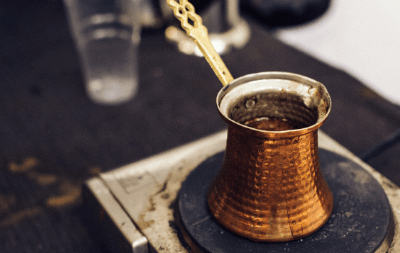I recently learned about an interesting style of coffee called Turkish coffee. I was curious to know what type of coffee beans are necessary, so I did a bit of research.
So, is Turkish coffee arabica or robusta? Turkish coffee is made using 100% dark roast arabica beans because they have a robust flavor and less bitterness. This is important because the Turkish brewing method pulls out bitter flavors from the grounds. The beans are commonly sourced from Brazil.
Read on to learn why arabica beans are important for Turkish coffee, which beans are the best to use, and how to prepare beans for this brewing method.

Why arabica beans are better for Turkish coffee than robusta beans
Arabica beans are better for Turkish coffee because they generally have a less harsh and bitter taste than robusta beans. The reason this is important has to do with the way Turkish coffee is prepared.
Turkish coffee is made by mixing finely ground beans, sugar and water in an Ibrik and brewing on a stove. After the brew is complete, the coffee and grounds are slowly poured into a small Turkish cup or mug to enjoy.
This means the coffee grounds remain in contact with the water for a much longer period of time than most other styles of coffee, where the liquid is strained off of the grounds before drinking.
Arabica beans have a less bitter taste
This increased contact time causes the grounds to over-extract organic compounds into the coffee, adding a bitter taste. The sugar counterbalances some of this bitterness, but it’s common for Turkish coffee to be on the more bitter end of the scale.
This is one reason why the less-bitter tasting arabica beans are more suitable for Turkish coffee than robusta beans.
Robusta beans were not discovered when traditional Turkish coffee originated
History shows that Turkish coffee was introduced to Turkey by the Turkish Governor of Yemen in the 1500s. We also know that robusta beans were most likely discovered in the 1800s, some 300 years later.
Therefore, we can safely assume that traditional Turkish coffee was prepared using arabica beans at the time. This certainly doesn’t mean that robusta beans cannot be used to make Turkish coffee.
In fact, many people enjoy the stronger and hasher flavors that robusta beans add to a Turkish brew. Don’t be afraid to experiment with different beans to find your preference.
The best arabica beans for Turkish coffee
People who have traveled to Istanbul have suggested that Brazil Santos beans were by far the most commonly used for Turkish coffee. I have read other sources that have also confirmed that Brazil and Central America are the most commonly sourced regions.
Coffee from the Brazilian Santos region is characterized by its smooth, creamy and nuanced flavors. Some people pick up subtle notes of cinnamon as well.
What about ground Turkish coffee?
Some retailers now sell ground Turkish beans specifically for this style of coffee. Although I haven’t tried these myself yet, I have heard mixed reviews from other Turkish coffee enthusiasts.
Some say that these grounds do not closely resemble traditional Turkish coffee. Many others would recommend staying away from pre-ground coffee altogether because much of the bean quality is lost when beans are exposed to oxygen for too long.
The other thing to remember is that Turkish coffee is a brewing method, so the specific beans you choose are less important than how you prepare it.
How to grind arabica beans for Turkish coffee
Turkish coffee beans are famously known for being finely ground. In fact, they should be ground more finely than pretty much any other coffee beverage you would make, including espresso.
It will be difficult, if not impossible, to find pre-ground beans that are suitable for Turkish style coffee. Unless you order Turkish coffee specific beans online or from a specialty coffee shop.
How to grind Turkish beans yourself
Turkish beans will be difficult to grind unless you have a high-quality burr grinder or grinder intended for espresso beans. The reason for this is because of the ultra-fine and uniform grind necessary for brewing in an Ibrik.
If you do have a coffee grinder, try grinding on your finest setting and see how your Turkish coffee turns out. If you find that your coffee tastes a little sour or watery, or you are unable to produce the characteristic Turkish foam, consider taking your beans to your local barista and have them grind them for you.
Turkish coffee is just a brewing method
Turkish coffee is ultimately just a method for preparing coffee and doesn’t call for a particular recipe. You should experiment with different roasts and bean types until you discover a Turkish coffee recipe that appeals most to you.



